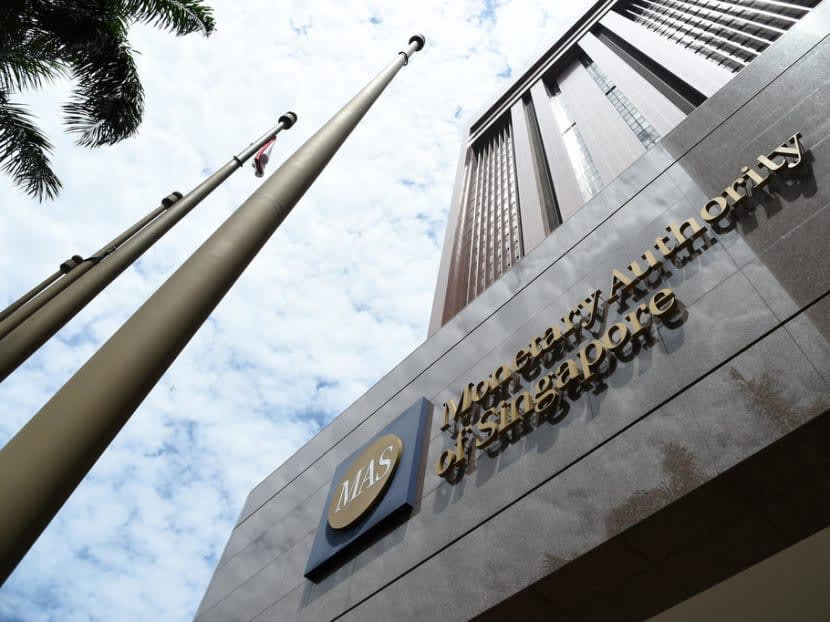Policy moves curbing rising prices, but S'pore cannot fully escape impact of global inflation: MAS

- Singapore's actions to combat inflation will slow down inflation over the next year, said Mr Ravi Menon, managing director of the Monetary Authority of Singapore (MAS)
- However, Singapore cannot escape the global trend of inflation
- Core inflation is set to continue upward to a peak of 4 to 4.5 per cent in the third quarter of 2022 before easing towards the end of this year
- Mr Menon outlined three measures to slow inflation, such as implementing monetary policies and providing fiscal support for vulnerable groups
- Rising interest rates will also increase the burden of debt servicing, but most households in Singapore can withstand the impact, he said
SINGAPORE — Government actions here to combat inflation will dampen its pace over the next year but the Republic cannot completely insulate itself from global rising prices, said Mr Ravi Menon, managing director of the Monetary Authority of Singapore (MAS).
“Inflation is expected to get worse before it gets better,” he said on Tuesday (July 19) at a media conference for the release of the MAS annual report for the latest financial year.
Inflation is surging in many countries around the globe owing to factors such as higher energy costs caused by the Russia-Ukraine war, and supply chain disruptions as many countries bounced back economically from the impact of Covid-19.
Mr Menon also said that interest rates in Singapore "are expected to rise further as global central banks continue to raise rates" to fight inflation. These higher borrowing costs will add to the debt burden of both households and companies here, he said.
Mortgage rates in Singapore have already increased sharply off a low base.
Central banks such as the United States Federal Reserve raise interest rates to make borrowing more expensive in an effort to slow spending by consumers and companies and thereby remove inflationary pressures.
Mr Menon said that Singapore’s core inflation rate, which excludes transport and accommodation, is projected to increase to a peak of 4 per cent to 4.5 per cent in the third quarter of 2022.
“It will then level off, and slightly ease towards the end of this year, though still around 3.5 to 4 per cent, much higher than what Singapore has been used to… Inflation is expected to ease further in 2023 but will remain well above the 1.5 per cent rate averaged since 2000.''
When accommodation and transport costs are included, the consumer price index for all items is expected to come in at between 5 and 6 per cent for all of 2022, said Mr Menon.
Over the past nine months, most recently earlier this month, the MAS has tightened monetary policy through adjustments to the exchange rate for the Singapore dollar against a basket of the country's main trading partners.
Mr Menon explained that MAS allows the trade-weighted exchange rate to appreciate faster when inflationary pressures build up to reduce imported inflation and restrain export demand, providing relief to labour market pressures.
This refers to the fact that a stronger Singapore dollar generally makes imports relatively cheaper and exports relatively more expensive for other countries, all other factors being equal.
The tighter monetary policy is estimated to dampen core inflation by 0.9 percentage points in the second half of the year.
And through the four monetary policies, MAS estimates that core inflation will be restrained by an average of 1.2 percentage points each year over 2022 and 2023.
These measures will help dampen rather than completely offset inflation, he said.
“Strengthening the exchange rate to try to fully offset the impact of global prices runs the risk of sharply curtailing growth and creating unemployment,” he said.
“Strengthening the exchange rate to try to fully offset the impact of global prices runs the risk of sharply curtailing growth and creating unemployment.Mr Ravi Menon, MAS managing director”
“When there is a pick-up in global food and energy prices of the magnitude we are seeing today, it is not possible to completely insulate the domestic economy from these increases.”
The Government helps to combat inflation by offering financial support to vulnerable groups who are less able to bear the sharp price increases.
Examples of this include the S$1.5 billion support package unveiled last month which will give 1.5 million adults in Singapore S$300 in a one-off cash payment and utilities credits to all households among other measures.
“The Government has been careful that fiscal support does not add stimulus to the economy that could exacerbate inflationary pressures,” said Mr Menon.
“A period of inflation is not the time for expansionary fiscal injections that could add to tightness in labour, land, and product markets. Fiscal support has therefore been targeted at the more vulnerable groups and designed to avoid stoking inflation or distorting price signals.”
A third key lever for controlling inflation is sound labour market adjustments to prevent entrenching inflation, said Mr Menon in his opening address.
“The relaxation of our border restrictions and resumption of foreign worker inflows should help to moderate labour cost pressures. To prevent a further build-up in labour cost pressures, it is important that the inflow of non-resident workers continues unimpeded,” he said.
Adjustments to the labour market include ensuring responsible wage settlements to restore workers’ purchasing power. However, attention has to be paid to prevent the risk of a wage-price spiral — which is when wages and prices chase each other, entrenching inflation.
“If real wages increase faster than real productivity, the increase in unit labour costs will lead to firms further raising prices to protect their margins, setting off a second round of wage increases and a wage-price spiral,” said Mr Menon.
While he noted that automatic wage indexation is rare in Singapore and the pass-through from prices to wages has been historically weak, the risk of this spiral cannot be discounted. This is especially so in the context of a tight labour market and high inflation.
HOUSEHOLDS MOSTLY ABLE TO HANDLE RISING INTEREST RATES
Mr Menon noted that rising prices and rising interest rates increase the burden of debt servicing, which poses potential risks of debt defaults, market volatility and financial instability.
“Domestic interest rates are expected to rise further as global central banks continue to raise rates, adding to the debt servicing burdens of corporates and households,” he said, noting that the increasing interest rates have also led to a rise in lending and mortgage rates in Singapore.
“MAS is closely monitoring any systemic risk to the financial system arising from debt-related stresses in the corporate and household sectors.”
He said that companies continue to manage debt-related risks as they have sufficient liquid assets like cash and equivalents exceeding their short-term liabilities.
As for households, MAS’ strict limits on household borrowing have ensured prudent borrowing.
For example, total unsecured debt is limited to 12 times a borrower’s monthly income, while the total debt servicing ratio caps a mortgage borrower’s overall debt obligations at 55 per cent of his income.
Mr Menon noted that the household debt situation in Singapore “remains generally healthy”.
“Stress tests by MAS suggest that most households should be able to service their debts even under scenarios of sharp interest rate hikes and significant income losses,” he said.
“But there will be a small segment of households which may be more constrained by rising interest rates.”
For vulnerable borrowers, Mr Menon said that they can consider restructuring options such as customised repayment solutions, or taking up a debt consolidation plan.
They can also seek help from Credit Counselling Singapore, which helps distressed borrowers work out debt management plans with their creditors.
“As global and domestic interest rates continue to rise, corporates and households should exercise utmost caution in taking on new financial commitments,” he said.
“They should plan for further interest rate increases and be sure of their ability to service their loans before making long-term financial commitments.”











